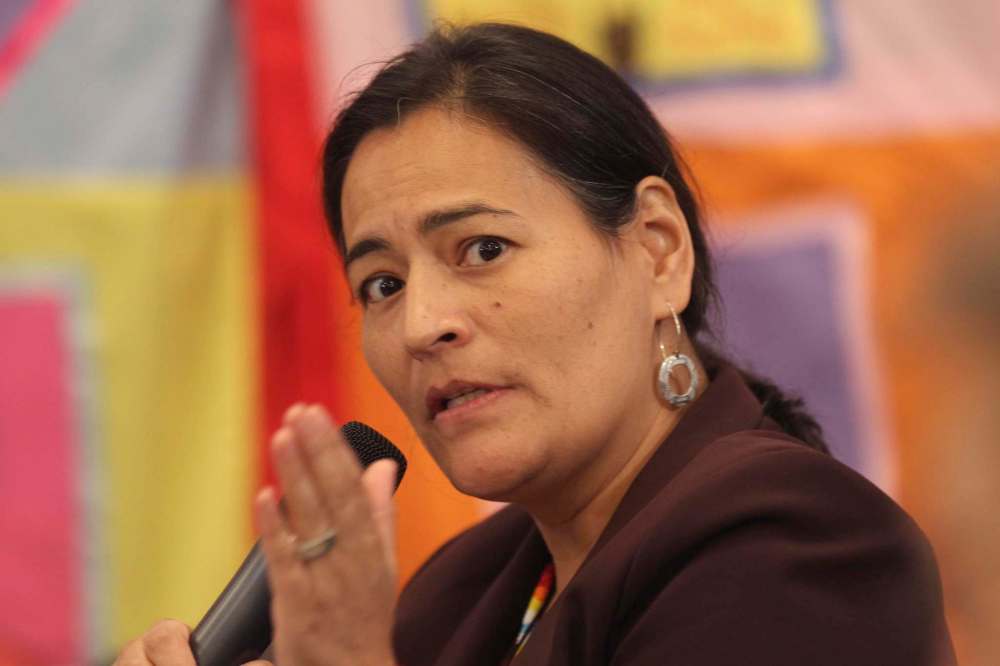Institutions will be held to account, commissioner says
Winnipeg hearings wrap up today
Advertisement
Read this article for free:
or
Already have an account? Log in here »
To continue reading, please subscribe:
Monthly Digital Subscription
$19 $0 for the first 4 weeks*
- Enjoy unlimited reading on winnipegfreepress.com
- Read the E-Edition, our digital replica newspaper
- Access News Break, our award-winning app
- Play interactive puzzles
*No charge for 4 weeks then billed as $19 every four weeks (new subscribers and qualified returning subscribers only). Cancel anytime.
Read unlimited articles for free today:
or
Already have an account? Log in here »
Hey there, time traveller!
This article was published 18/10/2017 (2379 days ago), so information in it may no longer be current.
Families and survivors give the National Inquiry into Missing and Murdered Indigenous Women and Girls the tools to hold institutional authorities to account for systemic flaws that play out in the lives of Indigenous people, an inquiry commissioner said Thursday.
“The family hearings are to honour your truth, to collect the facts, and it’s helping us to ask the hard questions in the second step, which is to take the hearings to the institutions,” said Michèle Audette, who led most of the public hearings this week in Winnipeg.
Few details are available yet on that phase of hearings, but reviewing and recommending systemic change is a part of the inquiry’s mandate from Ottawa. Its final report is due in 2019. Five days of hearings in Winnipeg wrap up today.

Testimony in the Manitoba capital has overturned stereotypes that victims are only drug addicts or sex workers. Many are also schoolchildren living in poverty and vulnerable to exploitation. Others were collateral damage in a cycle of crime and domestic abuse.
Audette is a former president of the Native Women’s Association of Canada, which championed the push for a national inquiry. Nearly 1,200 Indigenous women and girls went missing or were murdered, including 200 from Manitoba, between 1980 and 2012, according to a 2014 RCMP report.
“Thank God we have warriors to influence change, all that you did to change policies here. You don’t need to wait, you can act now,” Audette said of activists working in cities such as Winnipeg.
Audette signalled the commission is receptive to more hearings in Manitoba: “We have to come back… I don’t know where and I don’t know when. We have been offered an invitation up north, to go to Thompson. That is something we are very aware of, very sensitive to.”
Testimony to date, from Whitehorse, Smithers, B.C., and Winnipeg, along with hundreds of recommendations from reports such as the 1996 Royal Commission on Aboriginal Peoples and Manitoba’s Aboriginal Justice Inquiry (1991), all point to the influence of systemic factors.
“Twelve hundred recommendations over the years. And the list is growing longer. We want to know why systemic discrimination is still there,” Audette said.
The inquiry released an update Thursday showing 120 relatives of the missing and murdered have stepped forward to offer their stories in public and in private hearings since Monday; 75 had registered in the lead-up to the Winnipeg hearings.
The commissioner’s remarks followed a challenge from a pair of social justice advocates, who testified to their own experiences as victims of human trafficking.
Rachel Willan and longtime friend/transgender advocate Alaya McIvor shared the same hearing Thursday. Both used their personal experiences to describe how to work with police and social and justice officials to make positive social change.
Willan described her younger self as the worst “badass” and sketched out life as a victim of sexual abuse from the age of two. As a child-welfare ward, Willan lived in 53 foster homes and locked institutions, ending up in human trafficking and with a heavy drug addiction.
In 2007, facing a lengthy jail sentence, Willan said she’d had enough. She decided to get sober, get her children out of the child-welfare system and make a better life.
She graduated with a college diploma in social work last year, is married and works full time to improve social conditions for Winnipeg’s urban Indigenous people.
McIvor, who testified earlier in the week about the impact of the death of her cousin, Roberta McIvor, shared her story of landing on the streets of Winnipeg after child-welfare workers gave her the option of a one-way bus ticket out of Sandy Bay First Nation as an adolescent.
She was lured into trafficking, trading sexual services for a couch to sleep on. For years, McIvor was shipped from city to city across Western Canada, until she landed on Vancouver’s downtown eastside.
“People were actually fighting over me, like a piece of property,” McIvor said. “Never once did I want to be exploited or sexually trafficked. None of the women (do). They don’t wake up one day and say, ‘That’s what I want in my life, to be exploited.’”
alexandra.paul@freepress.mb.ca
History
Updated on Friday, October 20, 2017 7:18 AM CDT: Edited


